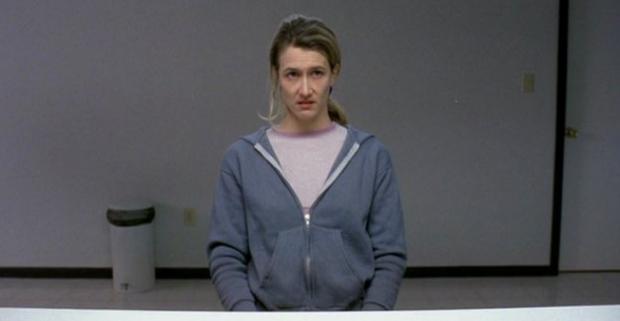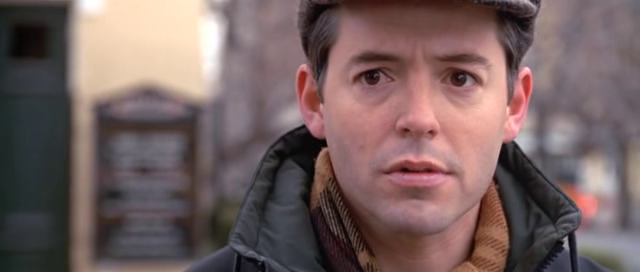
Alexander Payne directed and co-wrote only six films, including Election, About Schmidt, Sideways and The Descendants, but he’s regarded as one of the best American filmmakers working today. He’s directed some of the best performances from Hollywood’s top actors, including Paul Giamatti, Jack Nicholson, and George Clooney in starring roles, and he and his writing partner Jim Taylor have picked up two Oscars for best adapted screenplay. His new film, Nebraska, stars Bruce Dern, who won the best actor award at this year’s Cannes Film Festival. Nebraska adds another strong resonant chapter to Payne’s remarkable filmography, so we thought we should take a look back at his career. Here is our list of his movies in order of least favourite to favourite. Enjoy!
****

The Descendants
Written by Jim Rash & Nat Faxon and Alexander Payne
Directed by Alexander Payne
USA , 2011
In tone, approach, and general structure, The Descendants has much in common with Sideways and About Schmidt, so much so that the three can be labeled a loose trilogy. All three films feature road trips that mirror the shifting emotional terrain of the central character, and all three leads are faced with demons they need to overcome. In all three films, Payne incorporates unexpected humour into his narrative, which allows viewers to experience sadness without ever drowning in misery. In The Descendants, Payne provides a sympathetic, heartfelt look at a man standing at life’s crossroads. Payne walks a high-wire act between humour and heartbreak with incredible skill, and provokes timeless questions about race, class, conscience and identity. While the beautiful Hawaiian setting is important – and a crucial subplot involves the potential sale of a large parcel of unspoiled land – Payne never allows the beauty of the surroundings, nor the subplot, to overpower the central character. In the lead performance is George Clooney, delivering his finest and most emotionally raw performance of his career. The actor, often hailed as one of the sexiest men alive, completely sheds his movie star image and transforms into an average family man in his 50s with greying hair and bad posture. In place of the star glamour and sexy charm, is a father and husband who has failed in both roles. Much like Jack Nicholson in About Schmidt and Paul Giamatti in Sideways, Clooney plays a flawed man, desperately trying to find himself, and his performance here is honestly brilliant.
— Ricky D

Nebraska
Written by Bob Nelson
Directed by Alexander Payne
USA, 2013
What a relief it is for a film like Nebraska to exist. Its simplicity is part of its power. Alexander Payne, in returning to his roots after an extended period off followed by a trip to Hawaii with The Descendants, has tapped back into his greatest quality as a filmmaker: his humanity. Like Joel and Ethan Coen, he has the ability to go home again, depicting the region-specific quirks of its denizens and admitting their strangeness without laughing cruelly at the people or their ways. Nebraska is a film so keenly felt and realized that its performers, even those whose prior work in film and television we may recognize and cherish, do not feel as if they’re acting, only being. Alexander Payne spent some time away from his home state, but with this new film, he embraces it wholeheartedly, honestly, and triumphantly.
– Josh Spiegel

Citizen Ruth
Written by Alexander Payne and Jim Taylor
Directed by Alexander Payne
USA, 1996
Alexander Payne’s first feature film works as a strong political message for apolitical means, crafting Laura Dern (then known as Lynch’s darling in Blue Velvet and Wild at Heart as well as a star of mega-hit Jurassic Park) as society’s ideal loser trapped between two activist groups in the abortion debate. While he may have had the opportunity to create something of an effective political satire, the Hollywood atmosphere being ripe with material from Clinton-era jabs such as Wag the Dog and Primary Colors, Payne opted to center the conversation not on the political issues, but the instigators — those foaming at the mouth to have their various strains of morality validated on the nightly news.
Either a victim of the system or the dreck of society (depending on who you may be asking), Ruth finds herself in the uncomfortable position of being pregnant again with an unwanted child, information gathered after being picked up by the local police for being high on “hazardous vapors.” She is picked up by Gail (Mary Kay Place), a moral crusader, and rescued into the arms of a nice conservative family who plan to use her a political tool as one who would keep the baby even if an abortion would avert jail time. The Baby Savers are thwarted by a spy, the social-activist-guerilla Diane, who reveals to Ruth the nature of the Baby Saver machine and offers the abortion group’s genuine help for her well-being. Despite Diane’s probing use of the word “choice”, Ruth quickly learns of the liberal group’s wishing for her abortion, their own symbolic victory, and the stakes become higher as money becomes involved. Bribery is concealed through effective language (for the Savers, it is claimed the money is to help the baby, prematurely identified as “Tanya,” after birth in an effort to clear the accusation that conservatives don’t care about the baby outside the womb), yet the “choicers” see this as an opportunity to send a message (Payne’s finger-wagging phrase) that a woman’s choice can’t be bought. The film ends with an anti-climax, a proud middle finger within the noise of political rivalry to affirm that such issues stand outside Payne’s vision of a joke of a political battleground.
Payne’s early work shows a kind of characterization lost in his later work — full-blown satire complete with cartoon-like characters. The Baby Savers speak in Biblical platitudes, Gail reinforcing her sanctity-of-life values by calling her son a “little miracle” and that she’s blessed to have him; a nurse at an anti-abortion health clinic speaks of Ruth’s fetus like Chet from Barton Fink. The liberals retain a troupe of political guerillas, lesbians, and Vietnam vets with a house covered in anti-everything bumper stickers. Ruth is empty-headed, the extent of her political fervor being summarized in a line: “My body belongs to me! Right?” Yet, Payne allows her to develop an emotional resoluteness despite his wanton political cynicism: she believes in her own well-being, more than can be said of the radical groups, and can walk out of frame with her newfound dignity intact.
–Zach Lewis

About Schmidt
Written by Alexander Payne and Jim Taylor
Directed by Alexander Payne
USA, 2002
There isn’t much to Warren Schmidt. He lives a small life in Omaha, Nebraska, in a house scattered with collections from his housewife Helen (June Squibb) of 42 years. He spends his entire life working as an actuary for Woodman of the World Insurance Co., a job anybody can do, and apparently, nobody has notably done before. On his retirement day, Schmidt finds himself with nothing but time on his lonely hands. Schmidt is the antithesis of what young men want to be, and the mass of men undoubtedly amount to. Jack Nicholson is not such a man, but is known for his colorful lifestyle, which makes his performance of the self-delusional Schmidt all the more awe-inspiring. Even with his heavy screen presence, Nicholson inhabits Schmidt, breathing a life of sadness. When Helen drops dead and Schmidt finds himself stepping into his 35-foot Winnebago Adventurer, it’s not an act of interest that sets him afoot, but rather a moment of desperation. With his only daughter Jeannie (Hope Davis) fed up with his uninvolved ways, about to marry the dim-witted but good-hearted Randall Hertzel (Dermot Mulroney), Schmidt finally finds meaning in the rather disregarded new chapter of his life. He finds himself opening up to strangers, tackling waterbeds and sharing a hot tub with the topless and horrifically electrifying Roberta (Kathy Bates). Roberta is an open book, both crude and fun in the most vocal sense, which competes with the shish fabric of Schmidt. Her self-centered nature makes us realize that Schmidt isn’t selfish. There are things he wants, places he wants to see, and relationships he wants to improve (like with Jeannie or forgiving his dead wife over an affair she had with his best friend thirty years prior). There is hope that there is much more life to be lived by the old man. In one relationship, with a 6-year-old Tanzanian named Ndugu adopted via a TV infomercial, we witness his hunger grow. Through letters, Schmidt confesses and opens up to the boy deeper than those closest to him. Whether it’s to restore his faith in being a good father in some degree, or a form of release therapy, Schmidt’s small journey is to become more of a self-seeker, with (not necessarily through) those around him. In the beginning we observe a man without the needs to survive, whose life is ran by the emotions and needs of others. By the end, we are touched as he smiles at a boy’s painting, a boy he wouldn’t have known, if it weren’t for his only selfless act. Not decided by his wife’s needs, or his daughter’s guilt, or the obligations of his job. Rather, it’s based on his desire to live on. It’s tragic in the scope of a lifetime, but it’s a small triumph of breaking away from the norm. For many, it’s a triumph left unseen.
– Christopher Clemente

Sideways
Written by Alexander Payne and Jim Taylor
Directed by Alexander Payne
USA, 2004
Using the bachelor party as a jumping-off-point, Sideways becomes a movie about friendship, love, and wine. In Sideways, Payne holds true to the form he has become famous for, and balances drama evenly with humour. There aren’t many laugh-out-loud moments, but the comedy never seems forced or ill-timed. Sideways is at once a literate comedy, and a subtle but touching portrait of friendship and romance. Payne and his co-writer, Jim Taylor, take a less satirical approach than in their previous works Citizen Ruth, Election, and About Schmidt, and instead offer a more generous and forgiving view of humanity. The real strengths of Sideways are the characters it develops, and Payne has created four of the most lived-in, enduring characters in recent memory. There’s a great moment towards the end as the men say farewell; without words, their expressions speak volumes, making us truly believe we spent two hours watching real longtime friends spend quality time together.
– Ricky D

Election
Written by Alexander Payne and Jim Taylor
Directed by Alexander Payne
USA, 1999
Unless you’ve grown up in Omaha, or any other nondescript Midwestern town for that matter, it’s hard to describe the bare bitter cold of the winter. Everything is washed out; it’s like a permanent muted grey takes over the city. Somehow Payne seems to infuse every ounce of that bare brutality into each of his Election characters. Even if you don’t know the hell of a Midwestern winter, you can still relish the delicious, vicious, and brutally funny nature of the film. Election is frequently cruel to its characters, particularly Matthew Broderick’s hapless and often unforgivable teacher, but even with the less than forgiving portrayal, the audience never gets the sense that Payne is making fun of these characters. Payne attacks the material with so much glee and abandon that it’s hard not to fall head over hills in love with the finished product. This black-as-coal comedy is Payne’s best film.
– Tressa Eckermann

